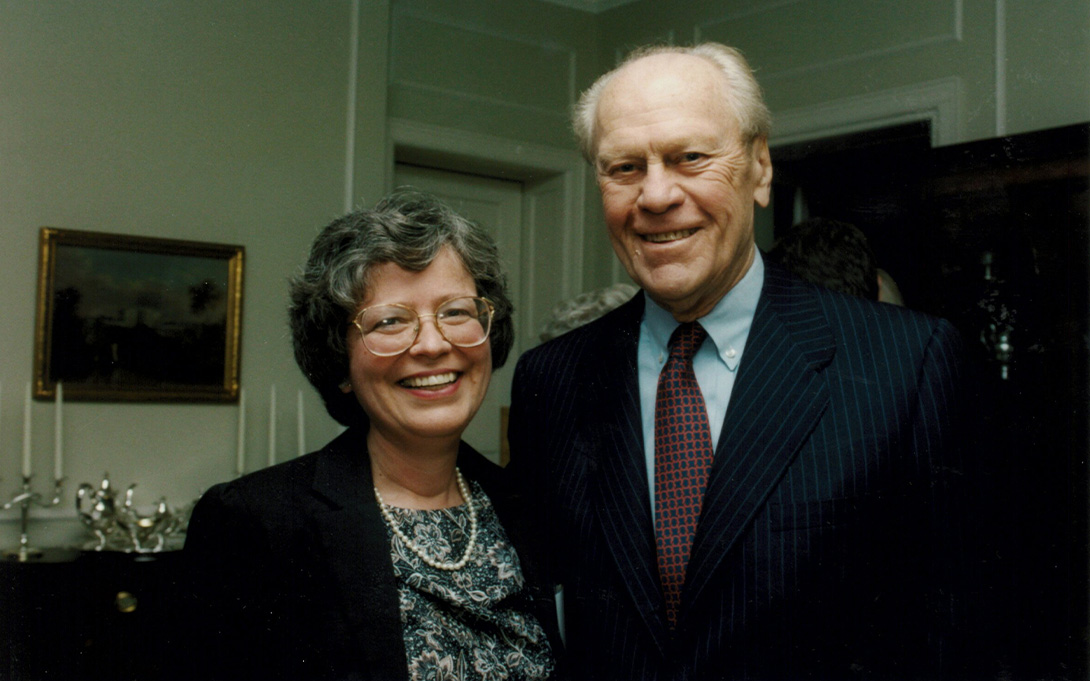
President Emerita Mary Sue Coleman and Provost Emeritus Paul N. Courant share their Michigan memories of Rebecca M. Blank, dean of the Gerald R. Ford School of Public Policy from 1999 to 2007. Blank also served in multiple federal roles and was appointed chancellor of the University of Wisconsin after leaving U-M. She died of cancer Feb. 17 at age 67.
Mary Sue Coleman
President Emerita
I first encountered Rebecca Blank, then dean of the Gerald R. Ford School of Public Policy, when I arrived at the University of Michigan in 2002.
The big issue confronting me and Becky was a compelling imperative to work with President Gerald R. Ford and his friends to raise enough money to build what became known as Weill Hall (named after Sandy and Joan Weill), a building designed by the noted firm Robert A.M. Stern Architects. What a wonderful and effective partner Becky was in that endeavor. She was relentless.
Provost Paul N. Courant and I did encounter grumbling in some quarters because we permitted the Weills to name the building for a bit less of a donation than the “posted price.” Paul came to the rescue by adopting a new rule, with which Becky was happy to comply. Such naming “exceptions” would only apply only to former U.S. presidents who also happen to be U-M alumni.
In addition to making possible a wonderful new home for the school, Becky substantially expanded the size of its academic programs (including the establishment of an undergraduate program), recruited wonderful new faculty, and substantially raised the national profile of this important unit on campus.
I was deeply impressed with Becky’s administrative skills, and while I was disappointed when Becky and her husband, Hanns Kuttner, eventually moved to Washington, D.C., where she was a senior fellow at the Brookings Institution before entering the administration of President Barack Obama, I was not at all surprised about her striking career trajectory after Michigan.
In 2009, she accepted the role of under secretary for economic affairs at the U.S. Department of Commerce, where, among other things, she oversaw the Census Bureau during the 2010 Census. She then moved into the role of deputy secretary at commerce and served more than a year as acting secretary. She left in June 2013 for the University of Wisconsin-Madison, where she had been named chancellor and where she remained as an outstanding university leader until 2022.
What about Becky though, as a funny, wise and caring human being? She was an economist, and the general assumption is that such scholars are experts in the “dismal” science that values market efficiency above all else. However, a prolific scholar and author, Becky focused on the interactions among low-income labor markets, macroeconomics and government policy. In fact, some of her best-known work was around improvements in the measurement of poverty, which was recognized in 2021 when the American Economic Association gave her its Distinguished Economist Award. She brought to the study of economics an array of human values in addition to market efficiencies.
As Wisconsin’s chancellor, she was deeply engaged in all aspects of university life. Furthermore, in all her multiple roles, she always exhibited a comprehensive perspective of the issue at hand.
When Becky chaired the NCAA Board of Governors and the Big Ten Council of Presidents, I observed that she ran tight meetings but also concentrated her focus on the health, safety, and academic success of student-athletes. When I was president of the Association of American Universities, Becky was one of those university leaders with whom I consulted often, both for her expertise in economics and her guidance in finding effective access points in the labyrinth that is the U.S. federal government.
My fondest memory of Becky, however, also occurred at AAU. Hanns wrote to my husband, Ken, and me suggesting an amusing competition for university presidents comparing campus videos celebrating the season. Of course, he and Becky probably understood that their entry would be among the best and they were correct. When we saw Becky and Hanns on screen and in distress because Bucky Beaver, the campus mascot, had devoured all the holiday cookies at UW just prior to an all-campus event, their contribution brought down the house!
That kind of humor and creativity made Becky a very special human being and university leader. I will miss her greatly, but I am blessed to have known her and to have counted her as a friend.
Paul N. Courant
Provost Emeritus and Distinguished University Professor Emeritus
Becky Blank was an unusually effective diplomat and bargainer, skilled in finding reasonably amiable solutions to knotty problems that worked well for all parties.
When Michigan was recruiting her from Northwestern to become dean of the Gerald R. Ford School of Public Policy, Becky rewrote the job description to include establishing an undergraduate program, central help in raising funds for a new building, expanding the size of the faculty, and more. Nancy Cantor, who was then provost, had the good sense to turn around and offer Becky the job that she had described, creating a bigger and better Ford School that continues to benefit from Becky’s skill and vision.
When Becky became dean, the Ford School was scattered across half a dozen locations on and around Central Campus, with no classrooms to call its own. Becky’s first priority was to build a building for the school, one that would house a full-fledged school of public policy. That building, now Joan and Sanford Weill Hall, is referred to by its inhabitants as “the house that Becky built.”
Several years after Weill Hall was fully in operation and Becky was chancellor at Wisconsin, Beth Johnson, who had worked most closely with Becky in raising funds for the building, passed away. Becky came back to Ann Arbor for the funeral service. She was a wonderful and caring friend.
She also was a skilled producer of fruit pies, wont to make her own desserts to add to dinners both informal and ceremonial. I will miss those pies.
The other day I found myself working on a project the success of which will require assembling a diverse and skilled group of colleagues. My first thought was to send a note to Becky to get her ideas. Sadly, I’ll have to get by without Becky’s direct help. Happily, her work, her values and her example will continue to enhance the lives of her friends, colleagues and students.
